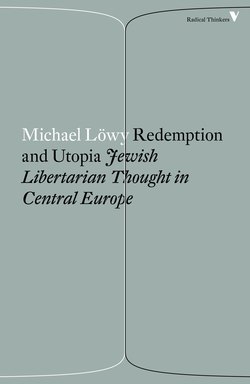Redemption and Utopia

Реклама. ООО «ЛитРес», ИНН: 7719571260.
Оглавление
Michael Löwy. Redemption and Utopia
REDEMPTION. AND UTOPIA. Jewish Libertarian Thought. in Central Europe. A Study in Elective Affinity. MICHAEL LÖWY. Translated by Hope Heaney
Contents
Introduction:The Defeated of History
1. On the Concept of Elective Affinity
2. Jewish Messianism andLibertarian Utopia:From ‘Correspondences’ to ‘Attractio Electiva’
3. Pariahs, Rebels and Romantics:A Sociological Analysis of the CentralEuropean Jewish Intelligentsia
4. Religious Jews Tending to Anarchism:Martin Buber, Franz Rosenzweig,Gershom Scholem, Leo Löwenthal
5 ‘Theologia negativa’ and ‘Utopia negativa’: Franz Kafka
6. Outside all Currents, at the Crossingof the Ways: Walter Benjamin
7. The Religious-Atheist and LibertarianAssimilated Jews: Gustav Landauer,Ernst Bloch, Georg Lukács,Erich Fromm
8. Crossroads, Circles and Figures:A Few Examples
9. A French Exception:Bernard Lazare
Conclusion: ‘Historical Messianism’:A Romantic/Messianic Conceptionof History
Notes
Bibliography
Index
Отрывок из книги
Introduction: The Defeated of History
1On the Concept of Elective Affinity
.....
Anti-capitalist romanticism – to use Lukács’s expression – is a specific political and cultural phenomenon which, in eluding all the usual classifications, has not so far received the attention it deserves. It is not captured within the traditional division of the political field into left/centre/right – or conservatives/liberals/revolutionaries or even regression/status quo/progress; it slips between the cracks of that classical grid and appears not to fall within the categories that have defined the major political options since the French Revolution. This problem is even more acute when applied to that tendency within romanticism which might be described as romantic revolutionary, and to which thinkers such as Hölderlin, Fourier, William Morris and Landauer belong. In this tendency, restoration and utopia, nostalgia for the pre-capitalist past (real or imaginary, near or remote) and revolutionary hope in a new future, are intimately and inseparably bound up with each other.23
Thus, the concept of neo-romanticism helps us to understand more clearly the resurgence, the rapprochement through elective affinity, and the occasional convergence and fusion of Jewish messianism (in its restorative/utopian interpretation) and libertarian utopia. The two had their roots in the same ethico-cultural and ‘ideological’ ground and grew in the same spiritual climate, that of the anti-capitalist romanticism of the German intelligentsia. Indeed, that cultural movement, particularly in its revolutionary romantic version, could not but favour the discovery, the revitalization or the development of both a restorative/utopian interpretation of messianism and a restorative/utopian interpretation of revolution (anarchism).
.....